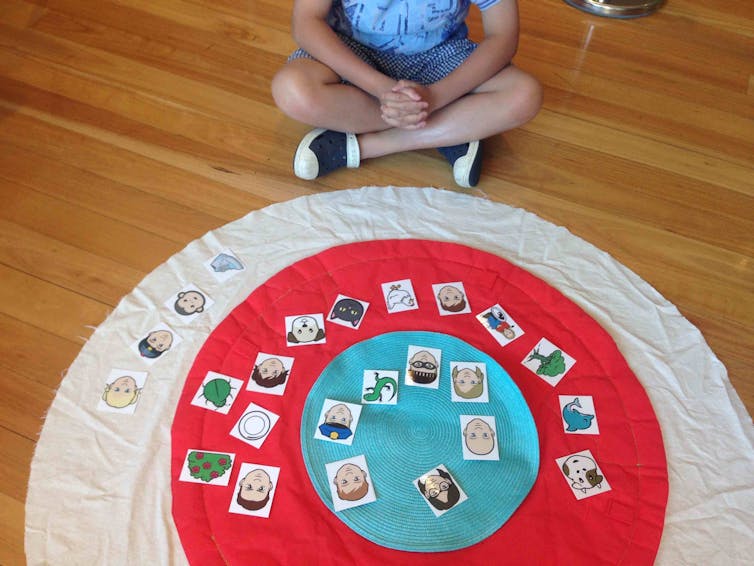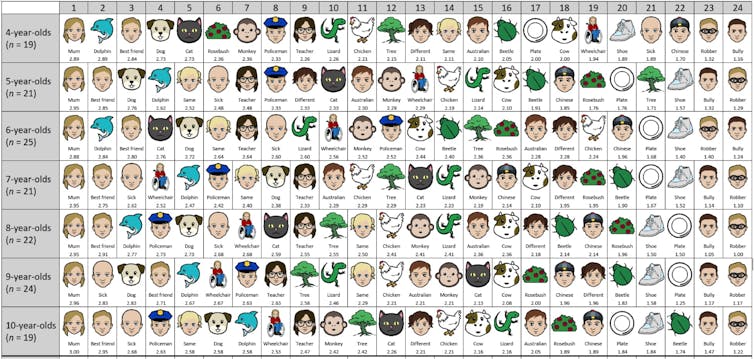children become more caring and inclusive as they age
- Written by Karri Neldner, PhD Candidate, The University of Queensland
Schools track and nurture the academic development of children, measuring literacy and numeracy against a bell curve. But what about children’s moral development? A new study has found this also develops over time, and there’s a lot parents can do to help it along.
Read more: How we decide who and what we care about – and whether robots stand a chance
Although adults’ sense of morality has previously been mapped, until now we have known little about what children care about, or how this might change as they age.
Our team of researchers from the University of Queensland recently examined the growth of moral concern (caring about the well-being of another) in children, and found children become more inclusive in who and what they care about as they age.
Moral growth in childhood
We asked 151 children - aged four to ten years - to map out how much they cared about a range of 24 things. These things included various humans, animals and inanimate objects. Our participants placed each one across three “moral circles”, indicating whom or what they cared about a lot, a little, or not at all.
 Children placed items in moral circles on a mat.
Author provided
Children placed items in moral circles on a mat.
Author provided
We discovered children included more targets in their moral circles as they aged. Their ability to extend concern to others improves with development, much like numeracy and literacy skills do. This suggests the penny drops at multiple points through a child’s moral development as their understanding of the moral needs of others becomes more nuanced.
We are born social: from an early age children are driven to share with, help and be liked by others. Helping behaviours can occur as early as 18 months of age, and become commonplace by age three. But these behaviours generally only occur in situations where helping doesn’t come at a direct cost (for example, giving up something you value such as a cherished toy).
In contrast, although a four-year-old recognises sharing is a good thing to do, and they punish others who do not share, they find it extremely difficult to do themselves. We found four-year-olds were the least likely to donate stickers they earned in our task to an unknown peer.
It’s only at the later stages at seven to eight years old that children begin to engage in altruistic sharing behaviours. At this age, children are becoming much more receptive to societal norms of fairness and justice. They will show aversion not only to unfair scenarios where they receive less than another child, but also when they receive more than another child.
This ability to incorporate the experience of others into our own decision making is the crux of moral reasoning. It’s this ability that might also explain why older children reported caring significantly more about vulnerable members of society – such as the sick and people with disabilities.
While four-year-olds cared just as little about a sick person as a shoe, from seven years of age children were reporting caring a lot about a sick person, placing them in their inner circle. Older children (so, age seven and above) also appear more capable of caring for more abstract concepts, such as the environment.
 While the items at either end remain similar, there is large movement across some targets in the middle as children grow older.
Author provided
While the items at either end remain similar, there is large movement across some targets in the middle as children grow older.
Author provided
To become a moral being is quite an undertaking, and it takes time. So, if your four-year-old seems more concerned about what’s in front of them than about people who need care most, give them time – they’ll get there.
Some things change, some things stay the same
Our research also demonstrates there are some moral preferences that appear stable across the lifespan. At any age, children prefer family members and best friends, keeping them in the inner circles of their concern.
Similarly, villains or wrongdoers are reliably cast outside our circles of concern: children at all ages report not caring about bullies and robbers. There is a strong preference for members of our ingroup (those we identify with, such as classmates) than an unfamiliar outgroup (such as children living overseas). These patterns are also reflected in adult samples, suggesting they are built into the human condition.
But this doesn’t mean these preferences can’t be influenced by experience. Simply having more contact with an outgroup member can help foster liking and feelings of similarity in both adults and children.
Similarly, reading stories to children containing main characters with a disability decreases prejudice in children towards disabled people from five years of age. By giving children the opportunity to engage with a wide range of people from diverse backgrounds, parents can help build tolerance and compassion in children.
Developing a moral future
The big picture here is these decisions tap into the origins of prejudice and tolerance. Understanding when these traits emerge means we can better develop ways to overcome bias and foster acceptance.
We all have a role to play here:
encourage sharing between your child and others
emphasise similarities between groups, not differences
read children stories with a diverse range of human and non-human main characters
explain why something is wrong, rather than just stating it’s wrong.
By doing this, we can all help to foster the moral development of our future generations.
Authors: Karri Neldner, PhD Candidate, The University of Queensland





